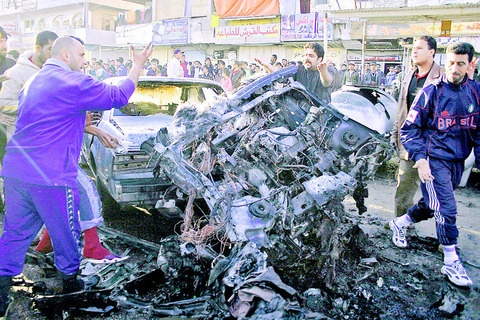A suicide car bomber killed 17 Shiites at a teeming Sadr City market on Wednesday, while gunmen in a predominantly Sunni neighborhood of Baghdad shot up a convoy of democracy workers in an ambush that took the lives of a US woman and three bodyguards.
The attack on the marketplace came one day after car bombings killed scores of university students just 3km away, indicating that al-Qaeda-linked fighters are bent on a surge of bloodshed as US and Iraqi forces gear up for a fresh neighborhood-by-neighborhood security sweep through the capital.
Although nobody claimed responsibility for either day's car bombings, such attacks are the hallmark of Sunni militants, who appear to be taking advantage of a waiting period before the security crackdown to step up attacks on Shiites.

PHOTO: AFP
Iraqi Prime Minister Nouri al-Maliki said on Wednesday that about 400 militiamen loyal to radical Shiite cleric Muqtada al-Sadr had been arrested over the past several weeks.
It was the first time al-Maliki detailed specific arrests of members of the Mahdi Army, which has been blamed for much of the sectarian killing in the past months.
A Baghdad Mahdi Army commander, meanwhile, said US and Iraqi troops launched a major campaign on Tuesday in Um al-Maalef, a Shiite neighborhood in south Baghdad.
"They detained every man who was able to carry weapons. We heard from our people in the area that about 400 people were detained," said the militia commander on condition of anonymity because senior figures in the group are not permitted to give their names.
He said that last month US troops had killed one of the Mahdi Army's top commanders, known as Abu al-Sudour, in Sadr City.
State television also reported that at least 100 insurgents were killed on Wednesday in clashes with Iraqi troops in a predominantly Sunni region northeast of Baghdad. Troops captured dozens of insurgents and seized large amounts of ammunition, the state-run Iraqiya channel said, quoting police.
The fighting reportedly took place near the district of Balad Ruz, 70km northeast of the capital. The report couldn't immediately be confirmed with Iraqi authorities.
An Iraqi army officer, who spoke on condition of anonymity because of security concerns, said the attack on the Western convoy took place in Yarmouk, a predominantly Sunni neighborhood in western Baghdad.
The three-car convoy belonged to the Washington-based National Democratic Institute, according to Les Campbell, the group's Middle East director. He said the four dead included a US woman along with three security contractors -- a Hungarian, a Croatian and an Iraqi. Two others were wounded, one seriously, Campbell said. Their names were withheld until their families could be notified.
The marketplace explosion took place near a popular commercial area in Sadr City, a sprawling Shiite district in eastern Baghdad.
The blast shattered the windows of nearby shops and restaurants, and blood pooled in the street. Angry Iraqis surrounded the charred mass of twisted metal, all that was left of the explosives-packed car.

Kehinde Sanni spends his days smoothing out dents and repainting scratched bumpers in a modest autobody shop in Lagos. He has never left Nigeria, yet he speaks glowingly of Burkina Faso military leader Ibrahim Traore. “Nigeria needs someone like Ibrahim Traore of Burkina Faso. He is doing well for his country,” Sanni said. His admiration is shaped by a steady stream of viral videos, memes and social media posts — many misleading or outright false — portraying Traore as a fearless reformer who defied Western powers and reclaimed his country’s dignity. The Burkinabe strongman swept into power following a coup in September 2022

‘FRAGMENTING’: British politics have for a long time been dominated by the Labor Party and the Tories, but polls suggest that Reform now poses a significant challenge Hard-right upstarts Reform UK snatched a parliamentary seat from British Prime Minister Keir Starmer’s Labor Party yesterday in local elections that dealt a blow to the UK’s two establishment parties. Reform, led by anti-immigrant firebrand Nigel Farage, won the by-election in Runcorn and Helsby in northwest England by just six votes, as it picked up gains in other localities, including one mayoralty. The group’s strong showing continues momentum it built up at last year’s general election and appears to confirm a trend that the UK is entering an era of multi-party politics. “For the movement, for the party it’s a very, very big

ENTERTAINMENT: Rio officials have a history of organizing massive concerts on Copacabana Beach, with Madonna’s show drawing about 1.6 million fans last year Lady Gaga on Saturday night gave a free concert in front of 2 million fans who poured onto Copacabana Beach in Rio de Janeiro for the biggest show of her career. “Tonight, we’re making history... Thank you for making history with me,” Lady Gaga told a screaming crowd. The Mother Monster, as she is known, started the show at about 10:10pm local time with her 2011 song Bloody Mary. Cries of joy rose from the tightly packed fans who sang and danced shoulder-to-shoulder on the vast stretch of sand. Concert organizers said 2.1 million people attended the show. Lady Gaga

SUPPORT: The Australian prime minister promised to back Kyiv against Russia’s invasion, saying: ‘That’s my government’s position. It was yesterday. It still is’ Left-leaning Australian Prime Minister Anthony Albanese yesterday basked in his landslide election win, promising a “disciplined, orderly” government to confront cost-of-living pain and tariff turmoil. People clapped as the 62-year-old and his fiancee, Jodie Haydon, who visited his old inner Sydney haunt, Cafe Italia, surrounded by a crowd of jostling photographers and journalists. Albanese’s Labor Party is on course to win at least 83 seats in the 150-member parliament, partial results showed. Opposition leader Peter Dutton’s conservative Liberal-National coalition had just 38 seats, and other parties 12. Another 17 seats were still in doubt. “We will be a disciplined, orderly